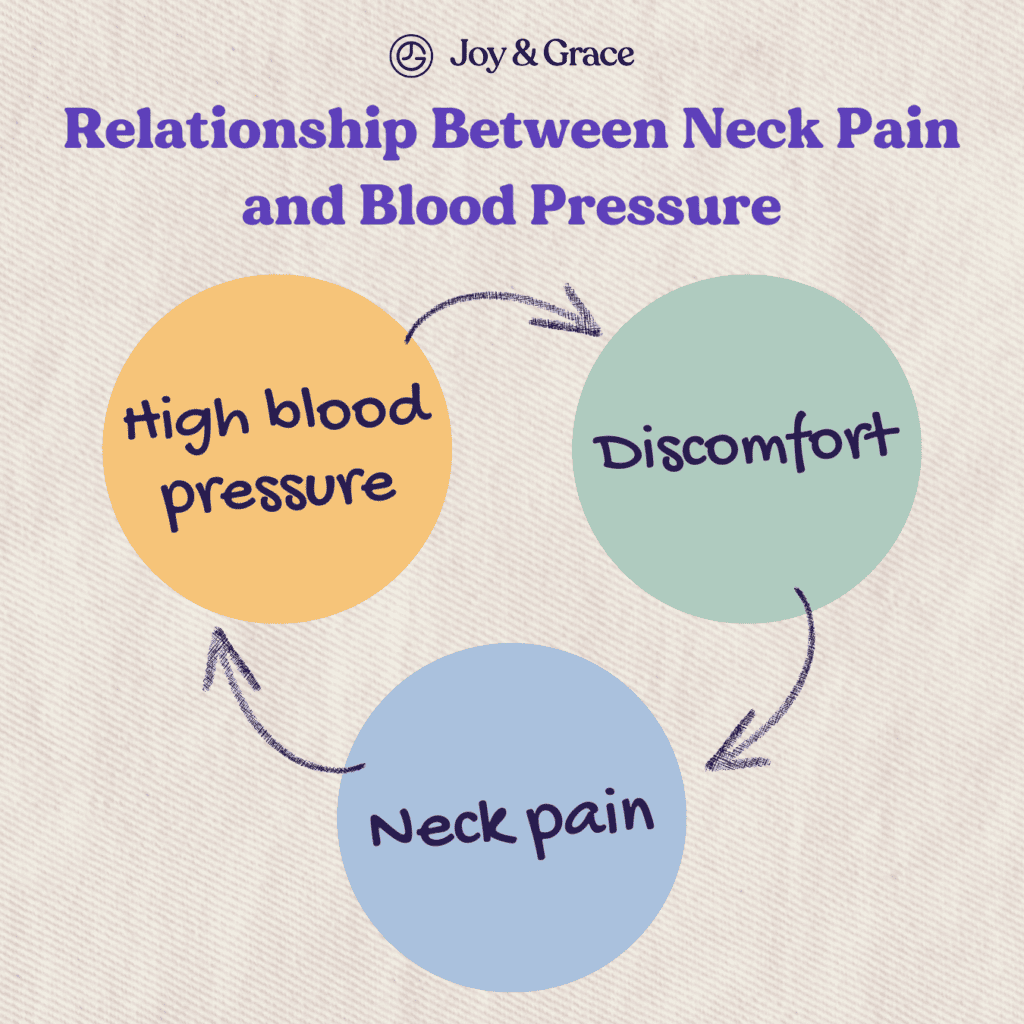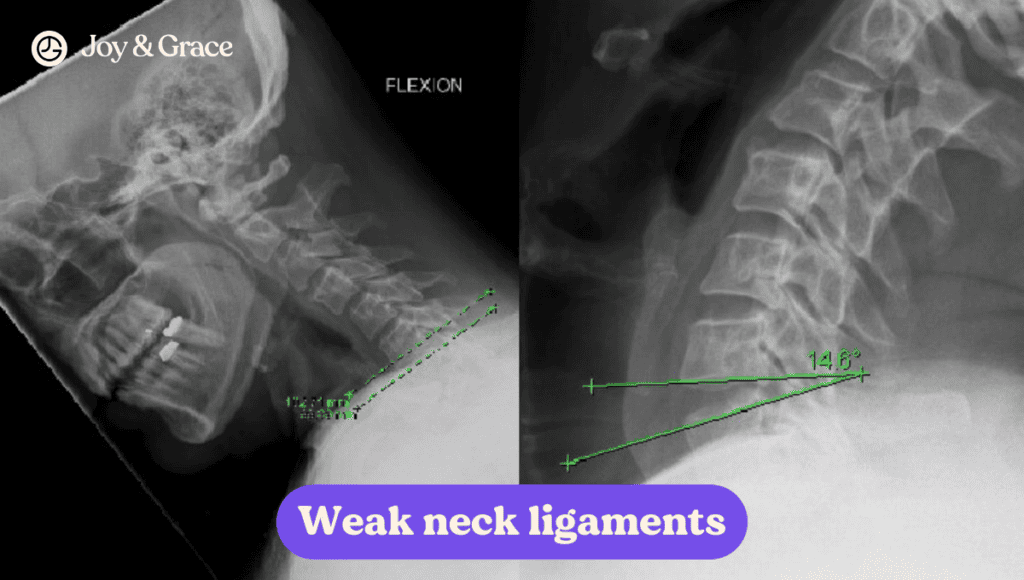When talking about medical disorders, high blood pressure, and neck pain are rarely mentioned in the same breath. Nevertheless, a link between them does exist.
This link is precisely what we aim to discuss in our blog post. Can high blood pressure cause neck pain? And more intriguingly, could neck pain raise your blood pressure? Let’s see for ourselves.
Is Neck Pain a Symptom of High Blood Pressure?
High blood pressure or high BP (also known as hypertension) is a condition in which your blood pressure remains too high. Hypertension is very common in the US, and many people don’t report any symptoms at all.
Some, on the other hand, may indeed sense a range of discomforts. One associated symptom of high blood pressure can sometimes be neck pain. Blood pressure measured above 120/80 mmHg is considered higher than normal.
However, you should know that neck pain does not typically directly result from hypertension. Neck pain itself is a common cause of discomfort and a major health problem worldwide. Its most common causes range from prolonged poor posture to injuries to bone degeneration.
So, what links neck pain to high blood pressure? Let’s discuss.
What’s the Relationship Between Neck Pain and Blood Pressure?

The relationship between neck pain and high blood pressure is a two-way street.
Some studies have shown that high blood pressure may indeed indirectly lead to neck pain.
But interestingly, others have found that neck pain may cause blood pressure changes.
Below, we list scenarios that demonstrate the link between these two conditions.
1. The Central Link Between Neck Pain and High Blood Pressure
A study from the Journal of Neuroscience suggests the relationship between neck pain and blood pressure may be located in the brain.
The study shows that nerves with signals from the neck are indirectly linked to the blood pressure control centers.
This is the supposed mechanism by which the brain's blood supply remains controlled when moving the neck. For example, our blood pressure may adjust when changing posture, turning the head, sitting, or standing up.
2. Stress and Anxiety
Stress and anxiety can trigger both high blood pressure and neck pain.
When stress and anxiety contribute to neck pain, it can cause our blood pressure to rise.
On the flip side, when they trigger high blood pressure, it can lead to a sense of discomfort, which can lead to tense neck muscles and neck soreness.
3. Hypertension and Neck Instability

An unstable neck may lead to increased blood pressure.
Neck instability occurs due to the weakening of the neck ligaments. These ligaments keep the neck vertebrae, or bones, in check when moving the neck. Weak ligaments lead to unstable movements and an unstable neck. So, how does neck instability affect blood pressure?
An unstable neck can first cause compression of vessels or nerves in the neck. Here, we can mention the vagus and glossopharyngeal nerves. These nerves control the so-called baroreceptor reflex. The baroreceptor reflex is a normal function that controls the blood pressure level and heart function. The baroreceptor reflex may go awry when the vagus or glossopharyngeal nerve is compressed. As a result, a spike in blood pressure may follow.
4. The Effect of Chronic Pain
A 2023 study hints at a link between chronic pain and heart and blood vessel disorders. Chronic pain persists even after three to six months.
Chronic neck pain may arise from:
- Strain from poor posture
- Arthritis (a degenerative joint disease)
- Intervertebral disc disease
- Muscle inflammation
- Injuries
Studies show that people with chronic neck pain can be more stressed and anxious as they’re dealing with the pain. Persistent pain can activate the stress-response (sympathetic) system. This response may damage blood vessels in the long term. Stress is also a known risk factor for high blood pressure.
In this sense, chronic neck pain can also be associated with hypertension.
5. Is My Neck Pain a Sign of a Heart Attack?

Subtle and ongoing neck pain is almost never a sign of a heart attack.
A heart attack is an unfortunate event that occurs when the heart muscle doesn’t receive the blood supply it needs. Neck pain ranks among the less representative but possible symptoms of a heart attack. But where does hypertension tie into all this?
Hypertension (especially when prolonged) has a narrowing effect on blood vessels. Untreated hypertension may even damage them.
The coronary arteries (the ones that supply the heart muscle) are especially vulnerable to hypertension. Under pressure, they may narrow and harden, decreasing blood flow to the heart.
If the blood flow is decreased to a critical level, a heart attack may develop. The following symptoms are typically present with heart attacks:
- Chest pain in the form of squeezing, tightness, or pressure
- Pain in the left or right arm, jaw, neck, back, and belly
- Breathlessness
- Vomiting or nausea
- Dizziness
- Sweating
- Anxiety or a feeling of doom
Heart attacks are medical emergencies. Sometimes, they might even happen without any symptoms. However, the symptoms we listed should serve as signs to call 911.
6. Hypertensive Emergency - Malignant Hypertension

Neck pain may, in rare cases, be a symptom of something known as malignant hypertension. People with this disorder have extremely high blood pressure levels. Malignant hypertension calls for immediate medical care, as it can severely damage organs.
Malignant hypertension usually has the following characteristics:
- It involves blood pressures higher than 180/120 mmHg (normal BP is 120/80 mmHg).
- It typically affects people who’ve had hypertension before.
- It can begin with an excruciating headache.
- It can cause nausea or vomiting.
- It may also lead to vision changes (such as blurred vision) and breathing problems.
- It may be associated with chest, back, or neck pain.
If these characteristics sound familiar, make sure to call 911 immediately.
7. Neck Artery Dissection and Stroke
As we said, prolonged hypertension may damage blood vessels. If the affected blood vessels are located in the neck region, the neck is the one that may suffer pain.
This is the case with a cervical artery dissection or tear. Arterial dissection happens when the vessels (arteries) tear apart from the massive pressure on their walls. The main affected neck arteries are the carotid and vertebral arteries. These arteries are crucial because they send blood to our precious brain.
Dissection-associated neck pain is persistent and often goes along with a severe headache. The neck pain from a carotid artery tear may spread along the side of the neck and toward the outer corner of the eye. Neck pain from an affected vertebral artery, on the other hand, can feel like a stab at the top of the neck or back of the head.
It’s essential to know about arterial dissection, as it’s a life-threatening disorder. Dissection can lead to a loss of blood and a stroke.
A stroke (or brain attack) occurs when the brain tissue gets no blood for whatever reason. The most common symptoms of stroke include:
- Sudden, severe headache and neck pain
- Dizziness and confusion
- Double vision and jerky eye movements
- Loss of balance while walking
- Slurred speech
These symptoms are always grounds for calling 911 as soon as possible. Early measures can save a life!
What Are the Symptoms of High Blood Pressure in the Neck?
If you expected a list of symptoms here, you won’t find it! The truth is that high blood pressure usually shows no warning signs or symptoms. You might not even know you have it! This is why it’s commonly known as the “silent killer," after all!
Hypertension-associated neck pain, however, can manifest in different ways. It can be sudden and severe or dull and chronic. It can also come along with other symptoms, as mentioned earlier. The quality of your neck pain depends on the underlying cause.
Can I Feel High Blood Pressure in My Neck?
You may sometimes describe high blood pressure in your neck as a pulsating feeling. This might be the case when a neck artery, such as the carotid or vertebral artery, becomes damaged.
Alternatively, neck pain spreading from the chest in heart disease may feel like sudden tightness. Neck pain as a symptom of malignant hypertension, on the other hand, often occurs when waking up. Chronic neck pain from neck instability is usually dull and can worsen with neck movements.
What Are the Alarming Symptoms of Hypertension?
Many of the listed symptoms associated with hypertension can signal a looming danger. Call 911 right away if you’re experiencing the characteristic signs and symptoms of:
- Stroke
- Heart attack
- Malignant hypertension
- Cervical artery dissection
What Helps High Blood Pressure Neck Pain?

The first step toward hypertension-associated neck pain relief is addressing your complaints. Help yourself by not neglecting your well-being. If you ignore your blood pressure, you’re playing a dangerous game with your own life!
Getting rid of hypertension-related neck pain involves eliminating the underlying cause. To achieve this, you need to pinpoint the cause first. Doctors are the only qualified people who can diagnose you properly.
Persistent neck pain shouldn’t make you assume high blood pressure is the culprit, though. If you’re unsure whether you have hypertension in the first place, consider measuring your blood pressure. It’s a simple procedure that you can do at home. All you need is a manual or digital BP monitor. You can always consult your doctor, who can measure it for you.
How Do I Treat Neck Hypertension?
Treatment for hypertension and its associated neck pain depends on what’s causing these conditions. Some conditions require immediate medical attention, whereas others might require more long-term management.
Traditional treatment for hypertension involves a combination of lifestyle changes and medical management. These measures can include:
- Taking your heart pills exactly as your doctor prescribed them
- Following a healthy diet, which ideally contains little fat, artificial sugars, and alcohol
- Performing regular, relaxing (not strenuous) exercises
- Managing your stress levels with mindfulness, yoga, massage therapy, or changes to your work environment
- Monitoring your blood pressure and doing regular check-ups
Neck pain can be temporarily relieved with over-the-counter painkillers. Here, we can mention Tylenol (paracetamol) and NSAIDs. Physical therapy, physical activity, and massage therapy may also help.
Note: We can’t stress enough how important it is to consult your doctor. A sinister cause might lie behind seemingly harmless neck pain and elevated blood pressure. The therapies we just mentioned are typical therapies against the two disorders separately. We advise you to pay attention to your symptoms and address them promptly.
Takeaway
High blood pressure, or hypertension, is when your blood pressure remains higher than 120/80 mmHg for a long time. Although neck pain can be an associated symptom of hypertension, it doesn’t usually directly result from it.
The relationship between neck pain and hypertension may stem from the brain.
Medical emergencies such as malignant hypertension, arterial dissection, stroke, or heart attack may be associated with hypertension and neck pain. They call for emergency care.
Hypertension can also be linked to neck instability, stress, and chronic neck pain.
High blood pressure usually shows no warning signs or symptoms.
You may sometimes feel high blood pressure in your neck as a pulsating feeling. It might present suddenly as severe pain or be chronic and dull.
Treatment for hypertension and its associated neck pain depends on what’s causing these conditions. Don’t ignore your symptoms! Address them with a healthcare professional to get the treatment you need.















